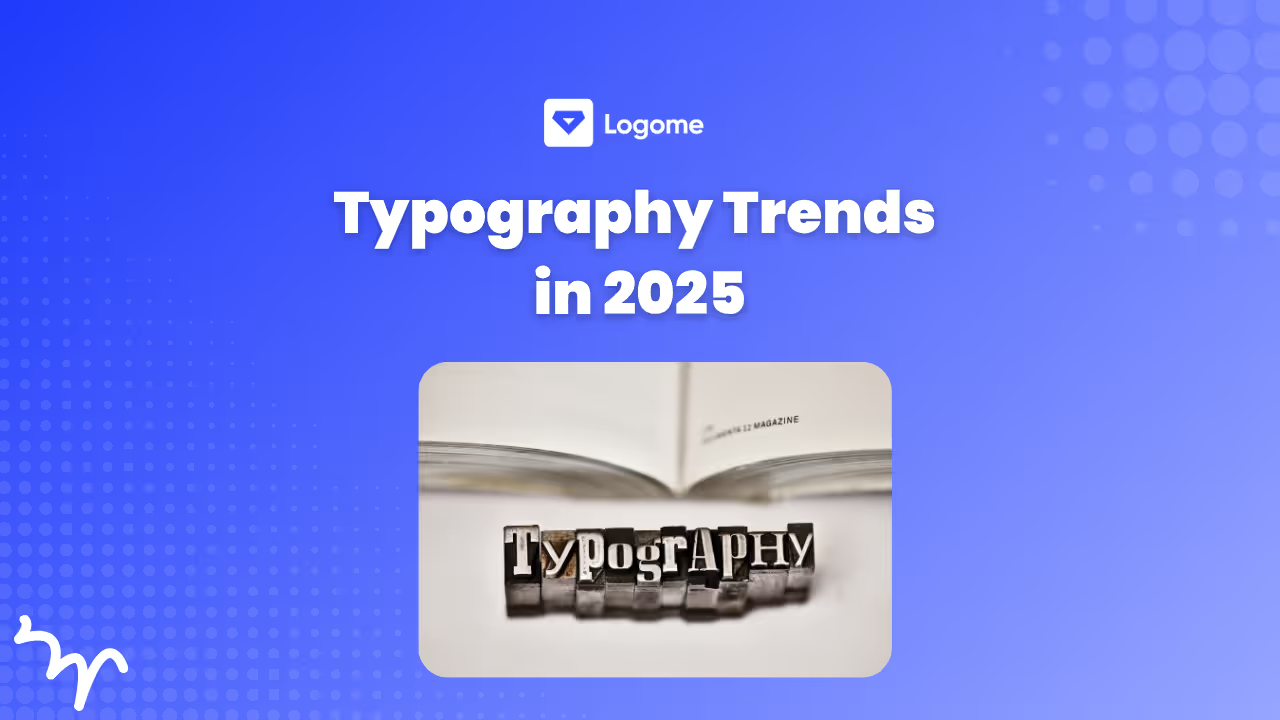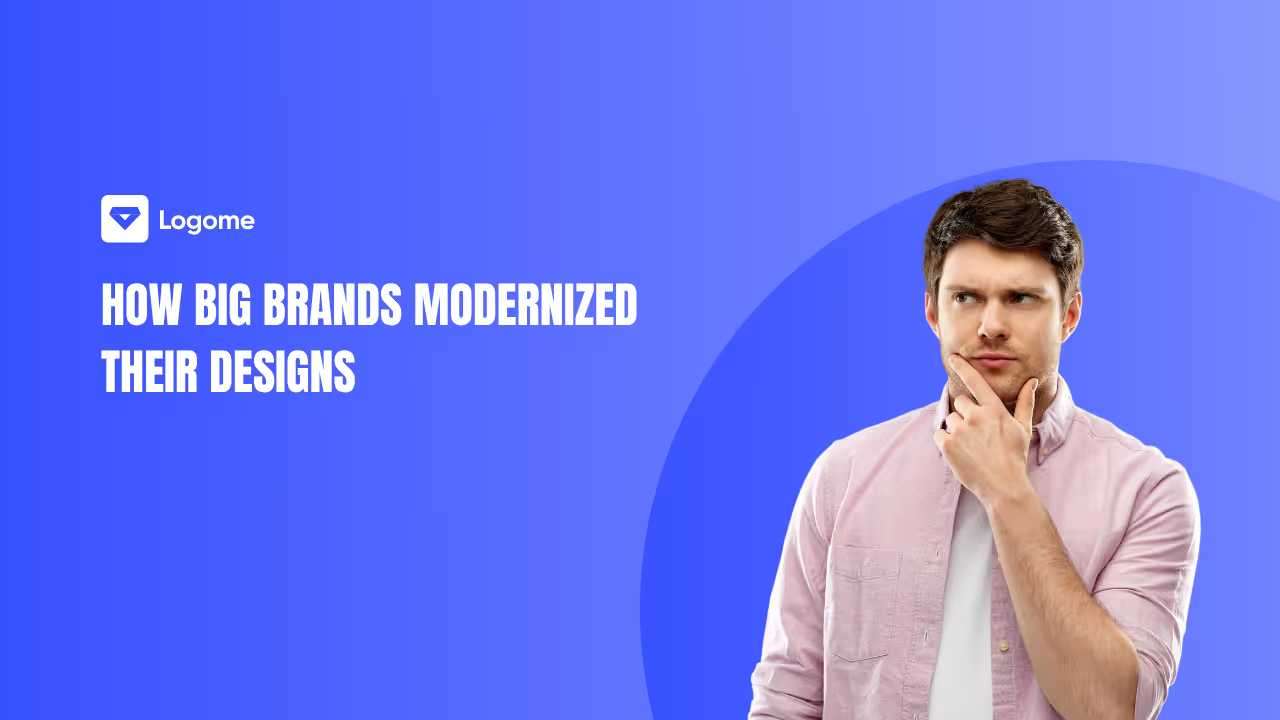Shapes Speak Louder Than Words: Shapes in Logo Design
Explore the psychology behind logo shapes and their meanings. Learn how to craft a visually compelling logo that tells your brand's unique story.
Explore the psychology behind logo shapes and their meanings. Learn how to craft a visually compelling logo that tells your brand's unique story.

In logo design, simplicity rules—clean shapes stick in our minds faster and stronger, making your brand unforgettable.

What do a road sign, a slice of cake, an umbrella, and a leaf have in common? At first glance, they might seem like unrelated objects. But each has a unique shape that's instantly recognizable and stirs a specific emotional response.
This is the power of shape in logo design—distinctive shapes create lasting impressions and evoke strong associations. Let’s start understanding the logo shapes and meanings with the help of famous brand logos in each shape category..
Research on visual communications talks about how the human brain associates with specific shapes.
The human brain is wired to respond to shapes uniquely, attributing characteristics and meanings to them. This is why logo shapes play such a pivotal role in branding. After all, the shape of your logo is like the foundation of a house; it sets the stage for everything else that follows.
Brands care a lot about shapes because they shape perception. The right shape doesn’t just make your logo look good—it also communicates your brand’s personality and message.
Most of you would recognize these logos even in black and white color because of their shapes.

Just think of the Nike Swoosh. That simple, swooping curve isn’t just a design choice; it’s a symbol of speed, agility, and excellence. Every time you see that swoosh, you might think of your favorite athlete or a time when you pushed your limits.
Geometric shapes and logos are like made for each other. They have long been the foundation of timeless logos, offering simplicity, balance, and instant recognition. Circles, like those in the Target logo, symbolize unity and inclusiveness, creating an inviting image. Triangles, often seen in logos like Delta, represent growth and direction, adding an air of ambition and progress. Squares and rectangles, like in Microsoft's logo, convey stability and balance, solidifying the brand’s reliability.
Yet, when these classics are given a modern twist—like layering, overlapping, or incorporating unexpected textures—they transform into something extraordinary. Think of the overlapping circles in the Mastercard logo, which add depth and connection, or the dynamic, twisted square in the Dropbox logo. These creative spins take traditional geometry and turn it into a force that makes logos not just iconic, but unforgettable.
Imagine the circle as the warm hug of the logo design world. Circles are all about unity, protection, and inclusivity. They’re like the comforting embrace of a close friend. Does this remind you of the Olympic logo and its overlapping rings?

That’s why brands like Pepsi and Mastercard use circles—they evoke feelings of wholeness and connection. The circle’s smooth, continuous shape suggests harmony and trust. It’s no surprise that you see circles in everything from social media icons to non-profit logos.
After all, who doesn’t like a good hug?


Triangles are like the overachievers of the logo world.
Depending on their orientation, they can scream power, innovation, or stability. An upward triangle symbolizes growth and ambition, much like the triangle in the Google Drive logo—representing stability, progress, and connection. Google Drive’s use of the triangle shape along with multiple colors like green, red, blue and more, suggests upward momentum, reflecting the platform’s ability to securely store and access files from anywhere, helping users grow and stay organized.

Think of the triangle as the “go-getter” shape. It’s perfect for brands that want to convey dynamism and strength, like Adidas with its three-stripe logo.

If circles are the warm hugs, squares and rectangles are the dependable handshakes.
They’re the backbone of design, giving a sense of stability and professionalism. Just like how you use a grid to organize your design, these shapes organize your brand’s message.

When you want your brand to be seen as solid and dependable, squares and rectangles are your go-to shapes. YouTube is a perfect example of how a rectangle logo design creates a remarkable lasting impression.

Lines are like the road maps of logo design.
Vertical lines suggest stability and growth, while horizontal lines give a sense of calm and tranquillity. Think about the smooth, steady lines in the Starbucks logo, which convey a sense of relaxation and community.
The IBM logo, with its clean, rectangular lines, exudes strength and reliability.

Lines can direct the viewer’s eye and create movement, making them perfect for modern, minimalist logos.

Organic shapes are like nature’s doodles—irregular, free-form, and wonderfully unpredictable.
They capture the essence of the natural world, from the gentle curve of a leaf to the rugged edge of a rock. Think about the smooth, curved lines in the Starbucks logo, which convey a sense of relaxation and community.

These shapes are perfect for brands that want to evoke a sense of authenticity and connection with nature. For instance, the logo for the natural skincare brand Lush uses organic shapes to reflect its commitment to natural, fresh products.
Curved shapes and spirals are like the dance moves of the design world—graceful and dynamic. They convey agility and creativity, much like the spirals in the logo of the popular yoga brand, Liforme.

Spirals represent growth and evolution, often associated with natural and scientific phenomena. They’re ideal for brands that want to communicate a sense of innovation and continuity.
Abstract logo shapes might seem like puzzles at first glance, but they’re often the most meticulously crafted and thoughtfully designed forms.
These shapes are born from the clever combination of simple elements like circles, lines, and curves to create something entirely new—an idea or belief encapsulated in a visual form. For example, Nike’s Swoosh is simply a curved line, yet it encapsulates motion, speed, and victory.

Abstract logos are like blank canvases—ready to be filled with meaning, emotion, and narrative while keeping designs sleek, modern, and memorable.. Abstract designs are like visual poetry; they tell stories that invite consumers to pause, think, and engage.
What’s more, abstract logos have a certain magnetic quality—they pique curiosity and make people want to dive deeper. They’re perfect for brands looking to communicate beyond the obvious, drawing viewers in with shapes that are open to interpretation. For example, the famous logo for the tech giant Slack is built on abstract shapes that convey a sense of inclusiveness and reliability.

Whether it’s a minimalist look or something more avant-garde, abstract forms offer endless creative freedom, allowing brands to express themselves without being boxed into literal images.
These shapes work especially well for companies that value creativity and flexibility over tradition.
As Picasso once said, “Art washes away from the soul the dust of everyday life.” Abstract shapes, in all their unconventional beauty, do just that—refreshing our visual senses and making brands stand out in a sea of straightforward symbols.
Abstract shapes are like a blank canvas—they allow for endless creativity and can tell a story that’s uniquely your own.
Symbols and cultural shapes are more than just eye-catching designs; they’re a universal language that communicates powerful ideas. From hearts and stars to crosses and crescents, these iconic shapes carry meanings that resonate across cultures and time.
As they say, "A picture is worth a thousand words," and these symbols say a lot more than meets the eye.
Take the star, for instance—it shines bright as a symbol of excellence and guidance, much like the Starbucks logo, guiding coffee lovers worldwide. The cross in red color, commonly seen in medical logos like Red Cross, conveys healing, care, and aid.

And let’s not forget the heart, a shape synonymous with love and compassion, yet it also finds its place in healthcare, like the American Heart Association’s logo.
With emojis and digital icons now embedded in our everyday communication, these shapes have taken on even greater significance. The heart symbol, for example, is one of the most frequently used emojis, echoing sentiments of affection across cultures.
But here’s where it gets tricky—symbols don’t always translate the same way globally. A shape might signify hope in one culture but carry a completely different meaning elsewhere.
Designing for a global audience? It’s essential to understand these cultural nuances. After all, you wouldn’t want to send mixed signals when your goal is to strike a chord!
Symbols and images such as logos are powerful because they tap into shared cultural understandings, making them a versatile choice for any brand.
Think of your logo shape as the outfit your brand wears. It should reflect your brand’s core values and target audience. For instance, if your brand is all about innovation, you might go for a dynamic, abstract shape.
Just like how a red heart feels different from a blue heart, colors and shapes work together to convey messages. Choose colors that enhance the shape’s meaning and align with your brand’s personality.
Different shapes suit different industries. A law firm might opt for a strong, geometric shape, while a yoga studio might go for something more organic and flowing.
Your logo should be a true reflection of your brand’s identity. It’s the first impression people get, so make sure it’s consistent with your overall brand message.
Choosing the right logo shape isn’t just about aesthetics—it’s about crafting a visual identity that speaks volumes. By understanding the psychology behind logo shapes and their meanings, you can create a design that resonates on a deeper level.
Certain shapes evoke specific emotions—circles symbolize unity, squares suggest stability, and triangles exude dynamism. When you grasp how these shapes influence perception, you gain the ability to create a logo that not only looks appealing but also tells a compelling story.
For instance, abstract logos like the iconic Nike Swoosh use curves to represent motion and speed, while geometric logos like the Mercedes-Benz three-pointed star symbolize precision and luxury. Additionally, lettermark logos like IBM or emblem logos like Starbucks lean heavily on the interplay of shapes and typography to create memorable identities.
With AI-powered logo design tools like Logome Logo Maker, you can experiment with various shapes, styles, and combinations that align with your brand’s vision. As designer David Airey wisely said, “Design is the silent ambassador of your brand.” So, make sure your logo shape is saying exactly what you want it to say!



Discover how 500,000+ businesses and creators are using our AI logo maker in their Logo creation.



